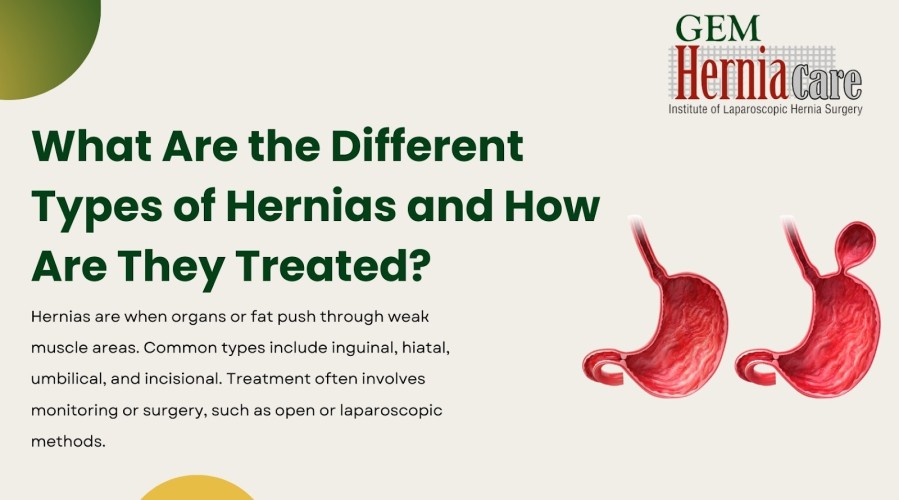Learn what gallstones are, their common symptoms, causes, and treatment options. Discover when to seek medical care and how to manage gallstone complications effectively.
What Are the Different Types of Hernias and How Are They Treated

Hernias are a common health issue where an organ or fatty tissue squeezes through a weak spot in a surrounding muscle or connective tissue. Understanding the different types and treatments can help you seek the right medical advice.
Common Types of Hernias
Inguinal Hernias:
Inguinal hernias are the most frequent type. They occur when intestines or fat push through weaknesses in the lower abdominal wall, often in the inguinal canal. This type is more prevalent in men than in women.
Hiatal Hernias:
This type happens when part of the stomach protrudes up into the chest through an opening in the diaphragm, potentially causing gastroesophageal reflux. It is more common in individuals over 50 years old.
Umbilical Hernias:
These are seen in babies under six months old when their intestines bulge through the abdominal wall near the belly button. It is also observed in adults with repeated strain on the abdomen.
Incisional Hernias:
These occur through an incision scar in the abdomen from previous surgeries. People who are active soon after surgery or those who are overweight are more susceptible to this type.
Treatment Options
Monitoring: Sometimes, small, pain-free hernias are just monitored for changes in size or discomfort.
Surgery:
For hernias causing pain or complications, surgery is often recommended. There are two main types:
- Open Surgery: This involves making a large incision to correct the hernia and then reinforcing the area with mesh.
- Laparoscopic Surgery: This is a minimally invasive technique that uses small incisions and a camera to guide the surgery. It typically offers quicker recovery times.
Points to Consider Before Surgery
- Type of Hernia: Different hernias may require specific surgical approaches.
- Overall Health: Healthier individuals recover from surgery quicker.
- Surgical Risks: Discuss potential risks with your surgeon.
Schedule an Appointment at GEM Hospital
If you're dealing with a hernia and need expert care, consider scheduling an appointment at GEM Hospital. Our team specializes in diagnosing and treating various types of hernias, ensuring you receive personalized care tailored to your health needs. Don’t wait for your symptoms to worsen—contact us today to get the help you need.
Blogs & Article
Learn about bloating and gas problems, including common causes, symptoms, and effective solutions to improve digestion, reduce discomfort, and maintain gut health.
Learn how unverified Ayurveda treatments may cause liver damage, understand the risks, symptoms, and why medical guidance is essential for safe care.


